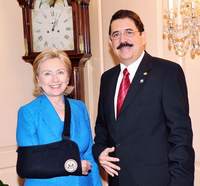WASHINGTON -- For more than a week, the State Department has stopped short of defining the military ouster of Honduras President Manuel Zelaya as a "coup."
The reluctance is fueling a political and legal debate over the definition of "coup," and whether the de facto Honduran government is legal. It has also fueled lingering suspicions that the U.S. might have been involved in the coup, given its longstanding ties to the Honduran military and the increasing criticism Zelaya has leveled at the United States in recent years. Venezuelan President Hugo Chávez has gone as far as to accuse the "Yankee empire," but not President Barack Obama, of playing a role in Zelaya's ouster.
The situation is testing Obama's stated desire to improve relations with Latin America and its leaders. That includes with Chávez, who is putting his political muscle behind Zelaya's attempts to regain power, ordering his country to cut off oil to Honduras as long as the Zelaya is not in power. For his part, Obama has condemned the coup without explicitly defining it as a "coup," and backed Zelaya despite his concerns about some of Zelaya's policies and his respect for Honduran law.

